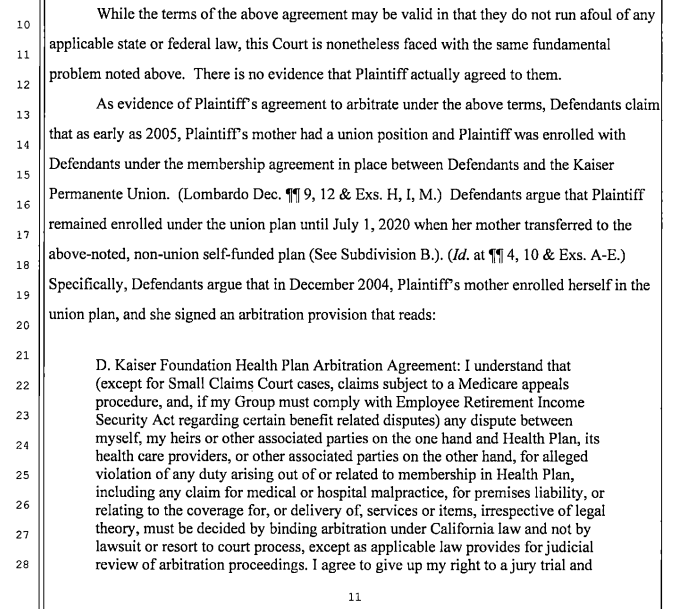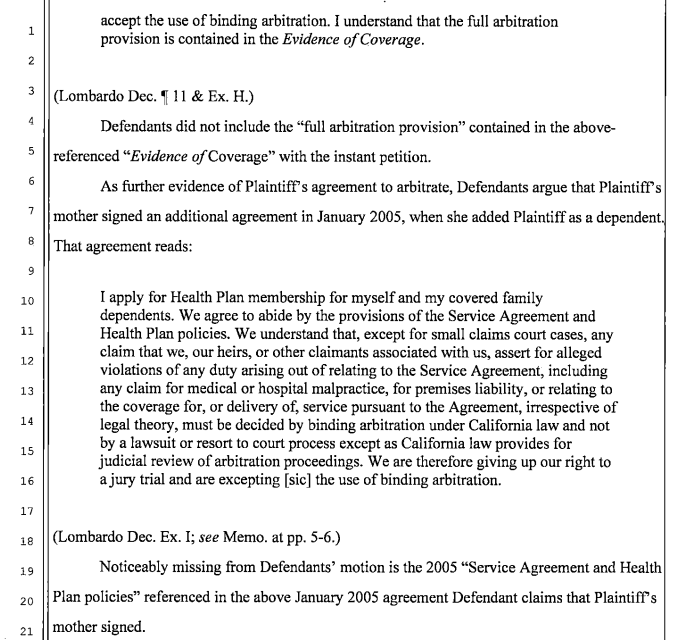What’s Up With Chloe Cole’s Lawsuit?
Checking in on the most famous detransitioner’s lawsuit against the Kaiser Permanente providers who once treated her gender dysphoria with transition care.
photo by Kelly Stuart
by Julie Rei Goldstein
On Monday April 15th, 2024, after almost 3 weeks from the oral arguments hearing, Judge Waters released his ruling denying Kaiser’s motion to compel binding arbitration in the case brought against them by Chloe Brockman (aka Chloe Cole).
(Read previous coverage of Chloe Cole’s lawsuit against her former medical providers.)
If you lived in a right wing anti-trans echo chamber, you might be led to believe that this is the legal win they’ve been waiting for that will finally hold medical providers accountable for providing trans youth gender-affirming care. Harmeet Dhillon (Founder and CEO of the Center for American Liberty, the organization in charge of handling Chloe’s case) shortly after the ruling celebrated the win on social media and leveraged it for another round of fundraising.
screenshot from twitter.com
The news was likewise celebrated as an enormous landmark victory by a veritable who’s who of anti-trans activists and journalists, including January Littlejohn, Miriam Grossman, Benjamin Ryan, Erin Friday, Rob Schneider (Star of “The Hot Chick”), Tiffany Justice, Graham Linehan, Gabrielle Clark, Andy Ngo, Carrie Mendoza, Charlie Kirk, and Ohio State Rep Gary Click (who sponsored the so-called SAFE Act, which banned medical care for trans youth in the state)
The only problem with this reaction is that the ruling itself has nothing to do with the merits of the medical malpractice aspects of the lawsuit itself. It’s a technical ruling on Contract Law. The primary concern for the Judge was whether or not the arbitration agreement Kaiser was seeking to enforce was properly referenced in the union plan agreement that Chloe’s mother, Jocelyn Brockman, signed back in 2005 when she initially added Chloe to her healthcare insurance coverage.
At this point it’s important to mention there are two other recent detransitioner cases brought against Kaiser (Richard Anumene and Kayla Lovdahl, aka Layla Jane) who had this same motion to compel arbitration granted.
So why did the ruling in those cases differ from the ruling in Chloe’s case? That boils down to how each of those parties was enrolled in coverage. The plan Chloe’s mom enrolled her in was a union plan she was entitled to in her employment benefits as a Kaiser employee. It turns out Chloe’s mom Jocelyn Brockman was employed as an RN for Kaiser Permanente, the same medical provider Chloe is suing.
When talking about the cycle of anti-trans political rhetoric, it’s important to mention that while Harmeet Dhillon was quick to announce the ruling in Chloe’s case, she’s remained quiet on the rulings in Kayla Lovdahl’s (aka Layla Jane) case, which she and the Center for American Liberty are still in charge of, even though the ruling occurred in November and Harmeet still regularly mentions Layla Jane.
Where will the case go from here? For starters it’s highly unlikely this ruling will be the last word on the motion to compel arbitration. Judge Waters himself at oral arguments alluded to the likelihood of there being an appeal regardless of how he ended up ruling.
If the ruling is affirmed on appeal or Kaiser decides to simply move forward, the next step is discovery, where each party will be able to request specific documentation from the other as well as subpoena involved parties and/or witnesses. Noteworthy is that there is currently an open motion in this case by Chloe’s team to compel Kaiser to provide further answers to 121 special interrogatories (SROGs). The reason Kaiser has pushed back on these is that they are vague and irrelevant to the case. Among these interrogatories is information on all patients who have received gender-affirming care through Kaiser and the other individual Defendants regardless of the outcomes, and including procedures Chloe herself did not undergo (e.g., phalloplasty). Among the vague interrogatories, Chloe’s counsel requested information on all patients who sought any form of gender-affirming care but were denied it. Defendants argue it’s impossible to define what would constitute “seeking” said care and how you define said request being “denied”.
There’s wider relevance to these special interrogatories as their scope seems to mirror recent actions by state attorneys general in Missouri, Texas, Indiana and Tennessee seeking to subpoena medical records and data of trans patients. This motion has yet to be ruled on, but will likely be brought up on or before the next case management conference in Chloe’s case scheduled for July 22nd.
In the wake of the announcement that the motion to compel arbitration by Kaiser was denied, on Friday April 19th, The Center for American Liberty made public the latest filings by Chloe’s legal team including a motion for leave to amend complaint to state claim for punitive damages, which included 12 different declarations in support of Chloe, including Michael Laidlaw, Stephen Levine, Beth Bourne, Jocelyn Brockman, and Kayla Lovdahl, as well as that of physicians and therapists who performed assessments on Chloe.
These filings detail how Chloe’s behavioral issues began at an early age and may have originated from a cleft palate for which she had surgery at a young age. She came out to her parents at age 12 which led to her father immediately recognizing this was likely the root of the psychiatric issues she’d been experiencing. Chloe’s psychologist Dr. Asulyan even noted just a few months into her treatment that seeing how dysphoria was affecting her, her mom Jocelyn was one hundred percent sure Chloe knew who [she] was, and felt comfortable consenting to puberty blockers and testosterone. The only worry Jocelyn seemed to have was how Chloe would be seen or judged by others and expressed fear for her safety. This in particular might be seen to contradict Jocelyn’s declaration, where she states she expressed concern to Dr. Asulyan on whether gender-affirming care was the best course of action for Chloe, and would have preferred to have been offered psychotherapy as an alternative treatment.
Chloe’s path to detransition is also detailed. In the months after her June 2020 bilateral mastectomy, she had significant bouts of depression that stemmed from being out of school and lacking access to her friends or outdoor recreation. It’s important to note that this being the summer of 2020, most of California remained closed due to COVID lockdowns, so this wasn’t a unique situation Chloe faced. The report details that around this time Chloe had significant substance abuse issues. She smoked marijuana sometimes daily and used alcohol socially and occasionally at home with instances of intoxication. In September of 2020, Chloe’s parents reportedly found a vape pen and alcohol in her room. Her substance abuse came to a head when, during one of a series of LSD trips, she reportedly began to regret transitioning after hearing a woman’s voice she interpreted as The Holy Spirit that told her she was lying to herself about being a boy and needed to start growing up. This experience led her to become a Christian and seek baptism.
Chloe details how in May 2021 she stopped taking testosterone, which led to her becoming intensely suicidal for the first time and became prone to emotional outbursts. She found it incredibly difficult to focus on anything including school, which resulted in her failing out of high school and getting a California High School Proficiency Exam Certificate. When asked how she learned to cope with PTSD, she says she developed with her own training some adaptive capacity. She also states she realizes that if she keeps herself active in opposing transitioning, she will stave off temporarily depressive feelings and ongoing despair. In regards to her employment history, she said she considers herself to be a “detransitioner advocate,” which includes public speaking at rallies/school board meetings, YouTube social media interviews, documentaries, and being featured in news articles. Her own physician team states in these declarations: “Once this case is resolved, Ms. Brockman will need to find other ways to invest her time and energy, as she is at risk for depression should she not find other meaningful activities. Her anti gender-affirming care activism is ultimately a form of hypomanic defense against the depression she reveals periodically as she breaks into tears over her own adverse consequences from the medical procedures she received.”
If you want to stay apprised on the status and updates regarding Chloe’s case as well as other current Detransitioner lawsuits in the US, the author has compiled them in a public spreadsheet.
Julie Rei Goldstein is an actress and voice over artist who reports on detransitioner lawsuits via #DeTransLaw.








